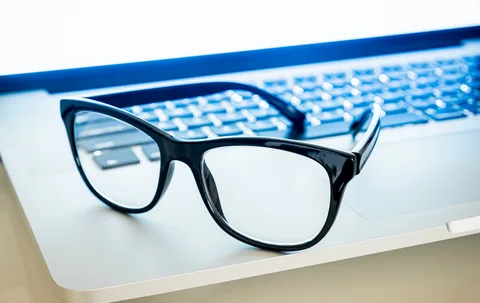In today’s digital age, the majority of us spend a significant amount of time staring at screens, whether for work, leisure, or social purposes. From smartphones to laptops and TVs, our eyes are constantly exposed to digital screens. One of the most debated topics in eye care recently is the impact of blue light on our eye health, and the potential benefits of blue light glasses.
Table of Contents
What is Blue Light?
Light is made up of a spectrum of colors, and each color has its range of wavelengths and energy. Blue light is one of the shortest, highest-energy wavelengths. Sources of blue light include the sun,LED lights, and, most predominantly, digital screens. While it’s essential to understand that not all blue light is bad (after all, the sun is our primary source), the concern lies in the concentrated and prolonged exposure from our devices.
Potential Effects of Blue Light on Our Eyes
1. Digital Eye Strain
One of the most immediate effects of prolonged screen time without protection is digital eye strain. Symptoms include dry eyes, blurry vision, headaches, and difficulty focusing. Some researchers believe that blue light might play a role in these symptoms, due to its high energy and short wavelength.
2. Disruption of Sleep Cycle
The human body has an internal clock or circadian rhythm that regulates sleep-wake cycles. Exposure to blue light, especially in the evening, can trick our brains into thinking it’s still daytime, suppressing the production of melatonin (a sleep-inducing hormone) and disrupting our natural sleep patterns.
3. Potential Retinal Damage
While more research is needed in this area, some studies suggest that prolonged exposure to blue light might lead to retinal damage and contribute to age-related macular degeneration, which can result in vision loss.
Blue Light Glasses: A Solution?
Given the potential risks associated with blue light, there’s been a surge in the market for blue light glasses. But do they really work?
1. Reducing Eye Strain
Many users have reported that wearing blue light glasses helps reduce the symptoms of digital eye strain. The lenses are designed to filter out the harmful range of blue light, thus reducing its intensity and potentially minimizing eye strain.
2. Improved Sleep Patterns
Some users have noted better sleep after using blue light glasses, especially when wearing them in the evening hours. By blocking out the blue light that suppresses melatonin production, these glasses can aid in maintaining a regular sleep pattern.
3. Long-Term Eye Health
While the long-term benefits of blue light glasses are still under investigation, if they reduce the risk factors mentioned above, they might play a role in preserving eye health over time.
Choosing the Right Pair
When searching for the perfect pair, it’s crucial to remember that not all blue light glasses are created equal. The effectiveness largely depends on the quality of the lens, its coatings, and how much blue light it filters out.
One reliable way to gauge a pair’s effectiveness is by looking at renowned brands. For instance, Ray-Ban glasses have been a staple in the eyewear industry for years and have incorporated blue light filtering technology into their lenses. Such trusted names can offer peace of mind when you’re making an investment in your eye health.
To Wear or Not to Wear?
While the debate continues, there’s a growing consensus that blue light glasses can offer relief, especially for those who spend extensive hours in front of screens. If you experience symptoms of digital eye strain or are concerned about the potential impacts of blue light on your sleep or long-term vision, investing in a pair might be worth considering.
However, it’s essential to incorporate other eye-healthy habits in conjunction with wearing blue light glasses. Taking regular breaks from screens, using the 20-20-20 rule (every 20 minutes, take a 20-second break and look at something 20 feet away), adjusting screen brightness and ambient lighting, and ensuring that screens are positioned at a proper distance and angle can all contribute to healthier eyes in our digital age.
Top Tips for Blue Light Glasses Users
When it comes to maximizing the benefits of blue light glasses and ensuring you get the most out of your pair, there are several additional aspects to consider. Here are some top tips for blue light glasses users:
1. Pair with Proper Prescription
If you already wear prescription glasses, ensure that your blue light glasses either have your up-to-date prescription or can fit comfortably over your existing pair. This ensures you’re not compromising on clear vision while seeking protection from blue light.
2. UV Protection is a Bonus
While the primary purpose of blue light glasses is to protect from artificial blue light from screens, some also offer UV protection. If you’re someone who transitions frequently between indoor and outdoor environments, a pair that also protects against UV rays can be beneficial.
3. Frame Size Matters
It might be tempting to choose a pair just for its aesthetics, but it’s essential to choose frames that cover your eyes adequately. This ensures maximum protection, preventing blue light from entering from the sides.
4. Nighttime Use
For those particularly concerned about the impact of blue light on sleep, consider having a dedicated pair by your bedside. Wearing them at least 1-2 hours before bedtime can be a practical approach to ensure minimal disruption to your sleep cycle due to evening screen time.
5. Regular Cleaning
Like any pair of glasses, it’s essential to keep your blue light glasses clean. Dust and smudges can reduce their effectiveness. Use a microfiber cloth and a suitable cleaning solution to ensure they remain spotless and effective.
6. Annual Eye Check-Ups
Even if you feel that blue light glasses are alleviating your symptoms, it’s still vital to have regular eye exams. This ensures that any underlying issues are detected early, and you can get professional advice on the most effective ways to protect your eyes.
7. Listen to Your Body
Lastly, always listen to your body. If you’re still experiencing eye discomfort, headaches, or sleep disturbances, it might be worth revisiting your habits or consulting an optometrist. While blue light glasses can be highly beneficial, they’re one piece of the puzzle in the broader scope of eye health.
By integrating these tips into your routine, you can ensure that you’re maximizing the benefits of your blue light glasses and prioritizing your eye health in our increasingly digital world. Remember, the best approach is always a holistic one that considers all aspects of eye care and wellbeing.





